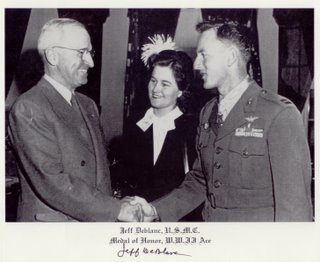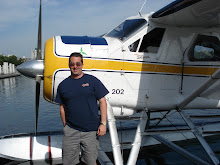Friday, July 21, 2006
Jefferson Deblanc 1921-2007

Jeff DeBlanc was born in Lockport, Louisiana on February 15, 1921. He joined the Navy and entered flight training in July 1941. He then transferred to the Marine Corps upon graduation on April 3, 1942 where he was then assigned to North Island in San Diego.
Jeff joined VMF-112 “Wolfpack” in October 1942 and departed ten days later to the Solomon Islands. With less than ten hours of flight time in the Wildcat, Jeff would see his first aerial combat. In his first air battle on November 12th, Jeff shot down two Japanese “Betty” bombers and received credit for another as a probable.
Jeff was a member of the famous “Cactus Air Force”. Jeff and his fellow Marine and Navy pilots would fly and fight almost every day against the on coming Japanese that were trying to take back the island run ways that the Marines now occupied. Jeff and the other pilots of the “Cactus Air Force” would take off and land on their airfield under small arms fire along with cannon and mortar fire from the Japanese hiding in the surrounding jungles.
In the Pacific the Japanese made great use of float planes which Jeff claimed his first on December 18th. On January 31, 1943, Jeff was escorting Navy and Marine SDB’s and Avengers to attack Japanese shipping up the “Slot”.
Jeff caught an enemy float planes on the tail of an SBD’s and dispatched the aircraft. The Wildcat that Jeff was flying was not his normally assigned aircraft. This was a long flight and even though his aircraft carried external drop tanks, his Wildcat was sucking fuel at an alarming rate.
The attack from Zero’s and float planes followed the American aircraft as they regrouped and were returning to base. Jeff was covering the bombers escape knowing that he may not have enough fuel to return to base.
Looking over his shoulder, Jeff saw more Zero’s approaching from the rear. He knew that the Zero’s would attack the bombers and claim the lives of more of his fellow aviators. Jeff turned his stubby fighter around and attacked the Zero’s head on knowing that now he would not make it back to base. Jeff’s Wildcat was riddled from machine gun and cannon fire from the Zero’s and Jeff was forced to bail out.
As he fell, Jeff knew that if he could make it to one of the Islands he could survive comfortably in the jungles. Growing up as a boy in Louisiana, Jeff came equipped with the natural skills of survival. As Jeff floated in his parachute, he also though about his fellow aviators who were returning safely to base and of the two float planes and three Zero’s that had fallen to his guns.
Jeff was able to swim to one of the Islands and hide until friendly natives found him and keep him safe until he was rescued thirteen days later. For Jeff’s decision to defend his fellow aviators against all odds, he would be awarded the Medal of Honor.
Jeff returned to the States and became an instructor and later returned to the Pacific with VMF-422 where Jeff would score his last victory of a Val dive bomber on May 28th.
Jeff retired as a Colonel in 1972 from the Marine Corps Reserve. During his military service he was credited with nine confirmed aerial victories and one probable. He was decorated with the Medal of Honor, Distinguished Flying Cross, Purple Heart and the Air Medal with 4 Gold Stars.
Jeff is the 26th highest scoring Marine Ace.
Dick Rossi 1915-2008

John Richard Rossi was born on April 19, 1915 in Placerville, California. Schooled in San Francisco, he attended the University of California at Berkeley. He entered the Navy for flight training in the fall of 1939.
Upon receiving his wings and commission in 1940, he was assigned as Flight Instructor at Pensacola, Florida.
"Dick" Rossi resigned his Navy commission in 1941 to join the American Volunteer Group (AVG) under the command of Colonel Claire Chennault. He arrived in Rangoon on November 12, 1941 with a group of thirty volunteers on the Dutch ship M.S. Bosch Fontein. He was undergoing a training program in P-40 aircraft at Toungoo, Burma, when Pearl Harbor was attacked.
Rossi engaged in his first combat over Burma in January 1942 (the second time he fired the guns in the P-40 he was in combat) and flew his last over the East China front in July 1942. Most of his combat missions were over Rangoon. Dick was a member of the AVG's First Pursuit Squadron (Adam and Eve). He also did detached combat duty with the Second and Third Squadrons, serving under all the AVG squadron commanders. He attained Ace status with a confirmed 6-1/4 victories in air-to-air combat.
When the AVG, better known as the "Flying Tigers," was disbanded in 1942, Rossi joined the China National Aviation Corporation, flying supplies from India to China. By the time the war was over he had flown more than 735 trips across the "Hump." After the war, Rossi, a founder of the freight carrier, the Flying Tiger Line, returned to California where he flew as a captain for 25 years, logging a lifetime of over 25,000 flying hours. He has served as president of the American Volunteer Group Flying Tigers Association for fifty-five years and is a member of the American Fighter Aces Association.
The Chinese government awarded Rossi the White Cloud Banner (Yun Mo) V Grade, China Air Force Wings (5 Stars) and the China War Memorial (Kang Chan Chi-nien Chang) Decoration. He has also earned and received two Distinguished Flying Crosses, the Air Medal, two Presidential Unit Citations, a World War II Victory Medal, the Asiatic Pacific Campaign Medal with four bronze stars for the India-Burma, Central Burma, China Defensive and China Offensive campaigns, and the Honorable Service Lapel Button. In 1969 he was given a Commendation from the USAF for sustained aerial support of combat operations in South Vietnam. The AVG was inducted into the Confederate Air Force Hall of Fame in 1998, in Midland, Texas. In 1999 Rossi was awarded the status of "Eagle" by the International Association of Eagles, Maxwell AFB, Alabama. The AVG was inducted into the National Aviation Hall of Fame in Dayton, Ohio, in July 1999.
Tally record: 6 - 1/4 victories
Rudy Augarten 1922-2000



